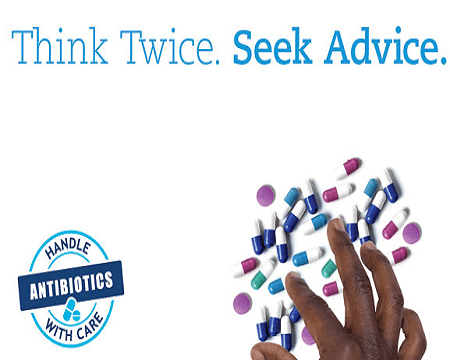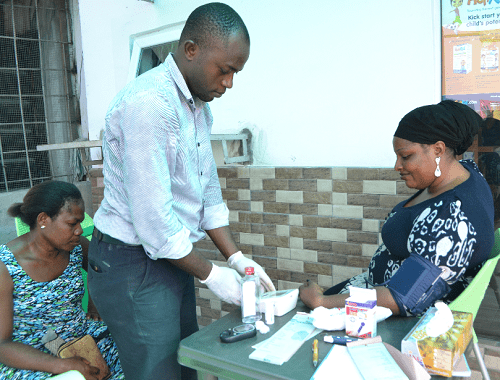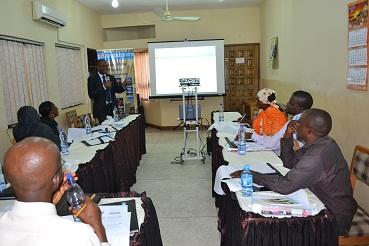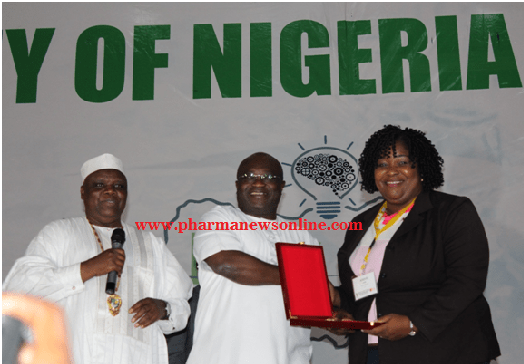COMMUNIQUÉ OF THE 90TH ANNUAL NATIONAL CONFERENCE OF THE PHARMACEUTICAL SOCIETY OF NIGERIA (PSN) TAGGED “ABIA 2017” HELD AT THE MULTIPURPOSE INTERNATIONAL CONFERENCE CENTRE, UMUAHIA, ABIA STATE FROM 6TH TO 11TH NOVEMBER 2017.
PREAMBLE
Nigeria has struggled over time to meet its full complements of essential medicines in its health system which still contends with significant negative indices.
Even when the National Drug Policy 2005 had envisaged that the country will produce at least 70% of its essential medicine needs by 2005, we failed to meet this target and indeed all other objectives, goals and targets of the NDP 2005.
As it stands today a veritable tool that enemies of Nigeria can exploit to fight Nigeria without a recourse to conventional warfare is to utilise the porous state of various points of entry via sea, land or air to ship huge batches of some of our fast selling drugs laced with toxic substances to inflict mortality on unsuspecting consumers of health.
This informed the choice theme of the 90th Annual National Conference of the PSN in 2017
“Medicines Availability and National Security”
The conference was declared open by His Excellency,Dr. Okezie Victor Ikpeazu, Ph.D the Executive Governor, Abia State, Nigeria.

Other dignitaries who participated at conference included the Wife of the President,Her Excellency, Hajiya Aisha Muhammadu Buhari, ably represented by the Former Deputy Governor of Plateau State, Her Excellency, Dame Pauline Tallen,OFR, His Excellency, the Deputy Governor of Abia State, Rt. Hon. Ude Oko-chukwu and his wife, Her Excellency Lady Vivian Ude Oko-chukwu, Former Deputy Governor of Abia State, His Excellency, Pharm. (Col). Emeka Ananaba Rtd, Distinguished Senators of the Federal Republic of Nigeria including Senator Mao Ohuabunwa, Senator Mohammed Suleiman Nazif, Senator Aliyu Sabi Abdullahi, Senator Ali Wakil, Hon. Minister of Health, Prof. Isaac F. Adewole, FAS ably represented by Dr Chukwu Abali, MD, FMC, Umuahia, Members of Abia State Executive Council including Dr. Emelike Godwill Okoro, Secretary to the Abia State Government and Deputy Chief of Staff, Elder John Nwobobu, the President of the African Pharmaceutical Forum, Dr. Prosper Hiag, President of Nigerian Association of Pharmacists and Pharmaceutical Scientists in the Americas (NAPPSA), Dr. Leo Egbujiobi, President Association of Professional Bodies of Nigeria (APBN), Dr. Omede Idris and the President of Nigeria Medical Association (NMA) Dr. Mike Ogirima ably represented by Dr Kingsley N Enweremadu, Past Presidents of the Pharmaceutical Society of Nigeria (PSN) including Pharm. Mohammed Yaro Budah, mni,FPSN, FPCPharm, FNAPharm, Pharm. (Dr.) U. N. O. Uwaga, mni,FPSN, FPCPharm, FNAPharm, FNIM,Pharm. (Sir.) Anthony Akhimien, mni, FPSN,FPCPharm, FNAPharm, FNIM,Pharm. Azubike Okwor, FPSN, FNAPharm, FNIM and Pharm. Olumide Akintayo, FPSN, FPCPharm, FNAPharm FNIM, Registrar, Pharmacists Council of Nigeria (PCN),Pharm. Elijah Mohammed, FPSN, FPCPharm, FNAPharm, FNIM, the Royal Fathers including HRM, the Uba of Ubakala, Eze (Pharm.) Ralph Mbagwu, HRM, the Inyi of Amainyi Autonomous Community, Imo State, Eze (Pharm.) Emeka Ogbonna and HRM, Igwe of Ogidi, Anambra State, Pharm. (Igwe) Alex Onyido.
The keynote address was delivered by Dr. Andrew S. Nevin, Partner-Financial Services Advisory Leader & Chief Economist Global Leader-Project Blue PwC Nigeria. Other eminent resource persons also made tremendous impact through presentations at the conference.
CONFERENCE RECOMMENDATIONS
Conference deliberated on the theme and sub-themes of the Conference and other contemporary issues influencing the pharmaceutical industry and its contributions to national development and made the following observations and recommendations:
- Conference noted unequivocally that unavailability of medicines and vaccines is a huge security risk to the Nigerian populace and called on Government and all relevant stakeholders to prioritize local production of drugs to ensure availability of medicines at all times.
Conference called for concerted efforts by all relevant stakeholders for the local production of active pharmaceutical ingredients (API) including engaging Dangote Group on requirements of the pharmaceutical industry to ensure those considerations are reckoned within the blueprint for Dangote’s petrochemical plant. Conference identified a critical need exists for investors and stakeholders to meet to fine-tune strategies going forward to enable stable outcomes.
- Conference admonished pharmaceutical manufacturers to form effective collaborations that will result in accelerated progress for the industry in a short period. One such required collaboration is with the Industrial Policy and Competitiveness Advisory Council a.k.a ‘Industrial Council’ which has a resolve to drive critical infrastructural development in the country. Others include collaborations with international Non-Governmental Organizations on contract manufacture, distribution and access to drugs, Bank of Industry for funds and regional manufacturing groups such as the West Africa Pharmaceutical Manufacturers Association.
Conference in particular recognised the important role of funding for the pharmaceutical industry especially for local production and distribution of drugs and called on pharmaceutical manufacturers to avail themselves of the available funding opportunities including Central Bank of Nigeria (CBN) Intervention funds, Bank of Industry (BOI) Intervention funds and Pharmaceutical Expansion Intervention funds.
- Conference applauded Presidential-level ‘Ease of Doing Business’ reform efforts of Government which involves simplifying the procedures for the import of vital raw materials and components needed for local manufacture of drugs in Nigeria as well as ensuring consistency in customs classifications and regulations. Conference was delighted that Government recognized that there were numerous obstacles and roadblocks that continue to afflict business innovation and growth, especially in the pharmaceutical sector and is addressing these concerns through the Ministry of Industry, Trade and Investment, Ministry of Finance and Nigerian Customs Service through use of tariff structures to incentivize local production and as much as possible discourage importation of those medicines that can be produced locally. Conference was assured that political will is assured via the mechanism of the Ease of Doing Business in Nigeria policy document and that policy somersaults occur when stakeholders are not involved in decision-making.
- Conference canvassed improved Research and development, as well as production of herbal medicines as the most easily achieved targets for the pharmaceutical industry and called on all relevant stakeholders to put their focus on these areas. Conference encouraged stakeholders to commit themselves to the local production of pharmaceutical grade corn starch by the year 2020.
Conference advocated the establishment of strong University-Industry partnership to promote technology innovation, entrepreneurship, supply chain and regulatory management to support the progressive movement of the local pharmaceutical industry to higher levels of the value chain. Conference reiterated the need for stronger collaboration between the pharmaceutical industry and the academia in the area of research and drug development in order to produce both locally available active molecules and other raw materials as one of the ways to attain self-sufficiency in local drug manufacture.
- Pharmacists under the aegis of the PSN conveyed their deep sense of appreciation to President, Muhammadu Buhari, GCFR, for appointing a Pharmacist, Prof. Moji Adeyeye as Director General/Chief Executive Officer of National Agency for Food and Drug Administration and Control (NAFDAC) in tandem with relevant enabling Acts of Parliament. Conference solicited a consolidation of this appointment through the immediate reconstitution of the Board of NAFDAC, PCN, NIPRD and NDLEA in view of the fundamental and pivotal statutory responsibilities of these strategic regulatory agencies in monitoring and control procedures in the entire drug development and distribution channels in Nigeria.
Conference further emphasised that for NAFDAC to truly safeguard the health of the nation, a compelling need for its Governing Board to be in place remains paramount, while the Pharmacists Council of Nigeria need its Governing Council to enforce its disciplinary powers on erring practitioners in addition to ensuring lawful accreditation of training facilities at Universities and other levels. Conference drew attention of the Federal Government to rising levels of drug abuse and misuse especially amongst the youth and reminded Government that further delays in reconstituting the Board of the NDLEA will only make the citizenry more vulnerable to hazardous state of health.
- Conference congratulated the Pharmacists Council of Nigeria (PCN) on the monthly newsletter “From the Registrars’ Desk” which has served as a veritable tool to update pharmacists on the happenings within the Registry and the practice specific online Mandatory Compulsory Professional Development (MCPD) program for recertification of Pharmacists as well as the online professional registration which kicked off this year. Conference directed all Heads of Pharmacy and Directors of parastatals and organizations to assist PCN by sending updated list of their members to the Registry to ensure a robust database for its operations.
Conference reiterated its call on the Pharmacists Council of Nigeria and the Academia to develop sufficient pharmaceutical human resources and local technical capacity through relevant education and training for the full implementation of the NUC-approved PharmD programme in all Faculties of Pharmacy across the country.
- Conference appealed to the Government (Federal and States) to activate the consultancy pharmacist philosophy by approving the consultant pharmacy status for all pharmacists that qualify for this status. Conference put on record as defined, a Consultant Pharmacist is “a Pharmacist who is paid to provide expert advice on the use of medications by individuals or within institutions, or on the provision of Pharmacy services to institutions” services already being offered by many pharmacists.Conference counseled all stakeholders in health that the consultancy cadre in Pharmacy is not to take away from any profession, but in reality, a value-added service to consumers of medicines in our joint resolve to make Nigeria’s brand of healthcare practice of global standard. Conference reminded President Muhammadu Buhari, GCFR, to approve the CONHESS adjustment circular for health worker which was one of the agreements signed between Government and Labour to call off the September nationwide strike of health workers.
- Conference lamented the seemingly slow pace of the implementation of the NDDG which was specifically amended to integrate operators in the existing Open Drug Markets which are expected to metamorphose into Coordinated Wholesale Centres in Ijora in Lagos State, Aba in Abia State, Onitsha in Anambra State and Kano by January 2019 in yet another shift announced by the Federal Ministry of Health in August 2017. Conference called on the Pharmacists Council of Nigeria and other stakeholders to work assiduously towards realising the new date in the bid to restore sanity to the nation’s drug distribution channels.
- Conference adopted the increased promotion being paid to the development of multidisciplinary teams by various healthcare professionals, research organizations and the current administration. Conference urges pharmacists to take an active interest in initiating and sustaining such collaborative efforts. Conference also urged the academia to mentor practitioners in developing the appropriate skills needed to function optimally within such collaborations to ensure pharmacists can practice at global standards, improving the health of the public. Conference strongly urged hospital pharmacists to pursue, as a matter of urgency, specializations in different areas of health in order to ensure their continued relevance within the healthcare delivery system in the hospital while community pharmacists should pursue primary care certification with globally accredited organizations like WHO and UNICEF as well as well as seeking appropriate payment mechanism under the National Health Insurance Scheme (NHIS).
- Conference invited pharmacy regulatory agencies, pharmacy associations and key leaders in community pharmacy to engage with government and other healthcare professionals to develop appropriate policies to institutionalize pharmaceutical care and public health oriented pharmacy services to enable practitioners practice these roles in a standardized manner. Conference also calls for the establishment of effective lobby mechanisms to ensure that the pharmacy profession and the pharmaceutical industry achieves its aim of providing optimal pharmaceutical services to the teeming health seeking populace.
- Conference congratulated the winner of the 2017 edition of the May and Baker Award, Pharm. (Prof.) Cyril Usifoh, FPSN and encouraged more Pharmaceutical Companies to emulate May and Baker in motivating and empowering pharmacists in all spheres of practice. Conference noted an improved response by pharmacists in the nomination process for the award and encouraged continued heightened publicity for future editions.
- Conference appreciated the enthusiasm of the Government and People of Abia state towards the hosting of pharmacists from across the nation which gave a clear signal to the nation of the high level of security and harmony in the state. Conference expressed gratitude for the warm hospitality and generosity of the Government and People of Abia State. Conference specially acknowledged the contribution of Pharm. (Dr.) Chris Ike, member of the Abia State Health Management Board, Sir Onyii Wamah, Permanent Secretary, Government House and Dr. Mike Enyinnah, Personal Physician to the Governor for their tireless commitment to ensuring a successful conference. Conference also appreciated the extensive developmental and entrepreneurial programs of the administration of Governor Okezie Victor Ikpeazu in the state and encouraged him not to relent in his quest to make Abia State an entrepreneurial hub for the country.
- Conference thanked the Executive Governor of Abia State, His Excellency, Gov. Victor Ikpeazu, the wife of the Governor of Abia State, Her Excellency, Mrs. Nkechi Victor Ipkeazu, the Deputy Governor, Rt. Hon. Ude Okochukwu, the wife of the Deputy Governor, Her Excellency, Lady Vivian Ude Okochukwu, Senator Mao Ohaubunwa, Senate Committee Chairman on Primary Health Care (PHC) and Communicable Diseases, His Royal Majesty, the Uba of Ubakala, Eze (Pharm.) Ralph Mbagwu, other eminent traditional rulers and the good people of Abia State for their generosity, hospitality and peaceful environment which facilitated the success of the Conference.
At the end of the Conference, the AGM elected the following pharmacists to serve and pilot the affairs of the Society for the next one year.
- Pharm. Ahmed I.Yakasai, FPSN, FNAPharm, FNIM – President
- Pharm. Daniel Orumwense, FPSN, FPCPharm
– Dep. President (South)
3 Pharm. (Hon.) John Enger,FPSN – Dep. President (North)
- Pharm. Emeka Callistus Duru – National Secretary
- Pharm. Uzoma Nwigudu – Asst. Nat. Secretary
- Pharm. (Mrs.) Adefolake Adeniyi,MAW – National Treasurer
- Pharm. Chinyere Osakwe – Nat. Financial Secretary
- Pharm. (Mrs.) Arinola E. Joda, Ph.D, FPCPharm, – Nat. Publicity Secretary
- Pharm. Tosin Adeyemi, FPCPharm – Editor-in-Chief
- Pharm (Dr.) Tawa Idubor,Ph.D – Internal Auditor
- Pharm. Victor Okwuosa,FPSN – Unofficial Member
- Pharm. Idris Pada,FPSN, FPCPharm – Unofficial Member
- Pharm. Olumide Akintayo, FPSN, FPCPharm, FNAPharm, FNIM – Imm. Past President
PHARM. AHMED YAKASAI, FPSN,FNAPharm,FNIM PRESIDENT
PHARM.GBOLAGADEIYIOLA,MAW
NATIONAL SECRETARY.











